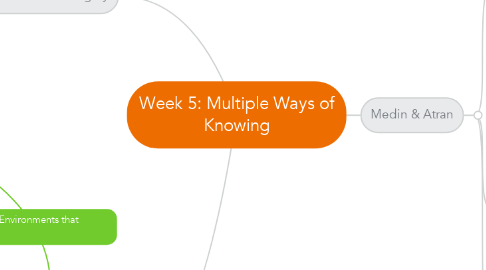
1. Common Ground
2. Barnhardt & Kawagley
2.1. Western Understanding
2.2. Research Goals
2.2.1. Document work
2.2.2. delineate structures
2.2.3. develop strategies for education
2.3. Native Lives
2.3.1. Elders
2.3.2. Language
2.3.3. Place
2.3.4. Honor
2.3.5. Dynamic
2.4. Worldviews
2.4.1. Western Science
2.4.1.1. Mono-cultural Education System
2.4.2. Indigenous Knowledge
2.4.2.1. Observes Natural Processes
3. Bang & Medin
3.1. Method: Participant Action Research
3.2. Goal: Equity as Nature of Learning
3.3. Contrasting Understandings of Culture
3.3.1. "box model"
3.3.1.1. Shared characteristics/behaviors
3.3.2. epidemiological approach to culture
3.3.3. everything is lived culturally
3.3.3.1. place
3.4. Community Based Science Cirricula
3.4.1. Need for and Underepresentation Indigenous people in STEM Professionals
3.4.2. Improve Student Achievment
3.4.3. Increase Native students participation in research
3.5. Epistemologies are Resources
3.5.1. Developed in everyday life
4. Medin & Atran
4.1. Folk Biology
4.1.1. We make sense of life
4.1.2. individuals' actions
4.1.2.1. cultural history
4.1.2.2. local environment
4.1.3. Structured Principles
4.1.3.1. 1. ranked taxonomy
4.1.3.1.1. "levels of reality"
4.1.3.2. 2. biological essentialism
4.1.3.2.1. "transmission of essence"
4.1.3.2.2. we are our parts
4.1.4. Essences
4.1.4.1. animal
4.1.4.1.1. life-form
4.1.4.2. not an animal
4.1.5. Conclusion
4.1.5.1. Taxonomies are insufficient
4.1.5.1.1. Generic species are "normal"
4.2. Cross-cultural comparison
4.2.1. triangulation
4.2.2. purposive sampling
4.2.3. populations
4.2.3.1. Itza' Maya
4.2.3.1.1. Projected among all animals
4.2.3.1.2. Gender differences
4.2.3.2. Undergraduates
4.2.3.3. Menominee adults/children
4.2.3.3.1. Generalized taxa from humans to animals
4.2.3.4. Rural adults/children
4.2.3.4.1. Generalized from humans to animals
4.2.3.5. Urban kids
4.3. Studies in Brazil
4.3.1. Children showed preference for traits of birth parent
4.3.2. biology is distinct from psychology due to organization
